David Stuttard | |
|---|---|
 |
David Stuttard is a British theatre director, classical scholar, translator, lecturer on classical literature and history, and author, primarily of historical works on the ancient world.
David Stuttard | |
|---|---|
 |
David Stuttard is a British theatre director, classical scholar, translator, lecturer on classical literature and history, and author, primarily of historical works on the ancient world.
Stuttard read Classics at the University of St Andrews and taught the subject for eleven years. As well as being a professional lecturer and author, in 1993 he founded the touring theatre company Actors of Dionysus, [1] which specializes in classical Greek drama. From 1993 to 2004 he was co-Artistic Director with Tamsin Shasha and directed his own translations and adaptations at venues in the UK and abroad. He has also written dramatic reconstructions of the lost Euripides plays Alexandros and Palamedes, which were premiered as part of 'The Trojan Trilogy' at the British Museum in April 2008. [2] He teaches at University College London Workshops and at the Ancient and Classical Worlds Summer School at The University of Cambridge. [3] [4]
| Euripides' 'Medea' | Translation | Penguin Audiobooks 1997 |
| Essays on 'Trojan Women' | Edition, with Tamsin Shasha | Actors of Dionysus 2002 |
| Essays on 'Agamemnon' | Edition, with Tamsin Shasha | Actors of Dionysus 2003 |
| An Introduction to 'Trojan Women' | An essay, with an adaptation and Audio CD of the play | Company Dionysus 2005 |
| Essays on 'Bacchae' | Edition | Actors of Dionysus 2006 |
| Looking at Lysistrata: Eight Essays and a New Version of Aristophanes' Provocative Comedy | Edition | Duckworth 2010 |
| AD 410: The Year That Shook Rome | Written with Sam Moorhead | British Museum Press 2010 |
| Power Games: Ritual and Rivalry at the Ancient Greek Olympics | British Museum Press 2012 | |
| 31 BC: Antony, Cleopatra and the Fall of Egypt | British Museum Press 2012 | |
| The Romans Who Shaped Britain | Written with Sam Moorhead | Thames & Hudson 2012 |
| The Parthenon: Power and Politics on the Acropolis | British Museum Press 2013 | |
| Looking at Medea: Essays and a translation of Euripides' tragedy | Bloomsbury Academic 2014 | |
| A History of Ancient Greece in Fifty Lives | Thames & Hudson 2014 | |
| Sappho: The Sweetness of Honey | Translations with Josephine Balmer, Audio CD | Actors of Dionysus 2015 |
| Greek Mythology: A Traveller's Guide from Mount Olympus to Troy | Drawings by Lis Watkins | Thames & Hudson 2016 |
| Looking at Bacchae: Essays and a translation of Euripides' tragedy | Bloomsbury Academic 2016 | |
| Nemesis: Alcibiades and the Fall of Athens | Harvard University Press 2018 | |
| Looking at Antigone: Essays and a translation of Sophocles' tragedy | Bloomsbury Academic 2019 | |
| Phoenix: A Father, a Son, and the Rise of Athens | Harvard University Press 2021 |

The Bacchae is an ancient Greek tragedy, written by the Athenian playwright Euripides during his final years in Macedonia, at the court of Archelaus I of Macedon. It premiered posthumously at the Theatre of Dionysus in 405 BC as part of a tetralogy that also included Iphigeneia at Aulis and Alcmaeon in Corinth, and which Euripides' son or nephew is assumed to have directed. It won first prize in the City Dionysia festival competition.

The Dionysia was a large festival in ancient Athens in honor of the god Dionysus, the central events of which were the theatrical performances of dramatic tragedies and, from 487 BC, comedies. It was the second-most important festival after the Panathenaia. The Dionysia actually consisted of two related festivals, the Rural Dionysia and the City Dionysia, which took place in different parts of the year. They were also an essential part of the Dionysian Mysteries.

The Frogs is a comedy written by the Ancient Greek playwright Aristophanes. It was performed at the Lenaia, one of the Festivals of Dionysus in Athens, in 405 BC and received first place.
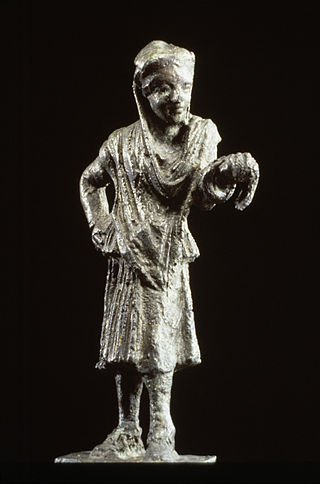
A theatrical culture flourished in ancient Greece from 700 BC. At its centre was the city-state of Athens, which became a significant cultural, political, and religious place during this period, and the theatre was institutionalised there as part of a festival called the Dionysia, which honoured the god Dionysus. Tragedy, comedy, and the satyr play were the three dramatic genres emerged there. Athens exported the festival to its numerous colonies. Modern Western theatre comes, in large measure, from the theatre of ancient Greece, from which it borrows technical terminology, classification into genres, and many of its themes, stock characters, and plot elements.
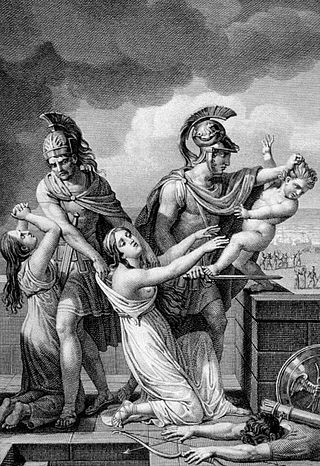
The Trojan Women is a tragedy by the Greek playwright Euripides, produced in 415 BCE. Also translated as The Women of Troy, or as its transliterated Greek title Troades, The Trojan Women presents commentary on the costs of war through the lens of women and children. The four central women of the play are the same that appear in the final book of the Iliad, lamenting over the corpse of Hector after the Trojan War.

The Digital Classicist is a community of those interested in the application of digital humanities to the field of classics and to ancient world studies more generally. The project claims the twin aims of bringing together scholars and students with an interest in computing and the ancient world, and disseminating advice and experience to the classics discipline at large. The Digital Classicist was founded in 2005 as a collaborative project based at King's College London and the University of Kentucky, with editors and advisors from the classics discipline at large.
Edith Hall, is a British scholar of classics, specialising in ancient Greek literature and cultural history, and professor in the Department of Classics and Ancient History at Durham University. She is a Fellow of the British Academy. From 2006 until 2011 she held a chair at Royal Holloway, University of London, where she founded and directed the Centre for the Reception of Greece and Rome until November 2011. She resigned over a dispute regarding funding for classics after leading a public campaign, which was successful, to prevent cuts to or the closure of the Royal Holloway Classics department. Until 2022, she was a professor at the Department of Classics at King's College London. She also co-founded and is Consultant Director of the Archive of Performances of Greek and Roman Drama at Oxford University, Chair of the Gilbert Murray Trust, and Judge on the Stephen Spender Prize for poetry translation. Her prizewinning doctoral thesis was awarded at Oxford. In 2012 she was awarded a Humboldt Research Prize to study ancient Greek theatre in the Black Sea, and in 2014 she was elected to the Academy of Europe. She lives in Cambridgeshire.
Simon Hornblower, FBA is an English classicist and academic. He was Professor of Classics and Ancient History in the University of Oxford and, before retiring, was most recently a senior research fellow at All Souls College, Oxford.
David Ridgway was a British scholar of Italian archaeology and the Etruscans.
Peter John Rhodes,, usually cited as P. J. Rhodes, was a British academic and ancient historian. He was Professor of Ancient History at the University of Durham. He specialized in Ancient Greek politics and political institutions.
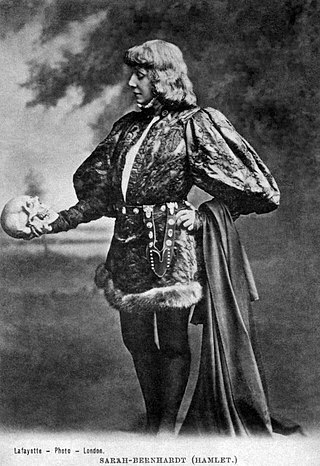
Theatre or theater is a collaborative form of performing art that uses live performers, usually actors or actresses, to present experiences of a real or imagined event before a live audience in a specific place, often a stage. The performers may communicate this experience to the audience through combinations of gesture, speech, song, music, and dance. It is the oldest form of drama, though live theatre has now been joined by modern recorded forms. Elements of art, such as painted scenery and stagecraft such as lighting are used to enhance the physicality, presence and immediacy of the experience. Places, normally buildings, where performances regularly take place are also called "theatres", as derived from the Ancient Greek θέατρον, itself from θεάομαι.
Reginald Pepys Winnington-Ingram, was a British classicist, an authority on Greek tragedy and ancient Greek music.

The Department of Classics is an academic division in the Faculty of Arts and Humanities at King's College London. It is one of the oldest and most distinguished university departments specialising in the study of classical antiquity in the United Kingdom.

Susan Jane Deacy is a classical scholar who has been Professor of Classics at the University of Roehampton since January 2018. She researches the history and literature of the ancient Greek world, with a particular focus on gender and sexuality, ancient Greek mythology and religion, and disability studies. She is also an expert on the teaching of subjects which are potentially sensitive, including sexual violence, domestic violence, and infanticide; she was project leader on the initiative 'Teaching Sensitive Subjects in the Classics Classroom'. She is also series editor of Routledge's Gods and Heroes of the Ancient World, and has been editor of the Bulletin of the Council of University Classical Departments since 2011.
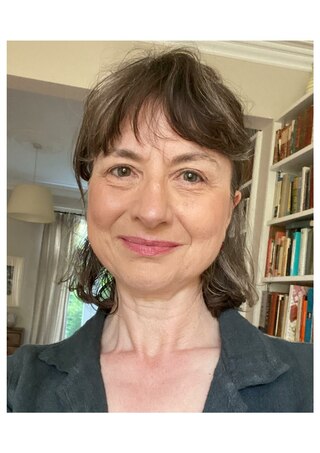
Emily Joanna Gowers, is a British classical scholar. She is Professor of Latin Literature at the University of Cambridge and a Fellow of St John's College, Cambridge. She is an expert on Horace, Augustan literature, and the history of food in the Roman world.
Fiona Macintosh is professor of classical reception at the University of Oxford, director of the Archive of Performances of Greek and Roman Drama, curator of the Ioannou Centre, and a Fellow of St Hilda's College, Oxford.

Miriam Anna Leonard is Professor of Greek Literature and its Reception at University College, London. She is known in particular for her work on the reception of Greek tragedy in modern intellectual thought.

Olakunbi Ojuolape Olasope is a Professor in the Department of Classics at the University of Ibadan in Nigeria. She is an expert on Roman social history, Greek and Roman theatre, and Yoruba classical performance culture. Olasope is known in particular for her work on the reception of classical drama in West Africa, especially the work of the Nigerian dramatist Femi Osofisan.
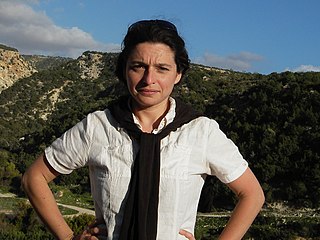
Elena Isayev is Professor of Ancient History and Place in the Classics and Ancient History Department at the University of Exeter. She is an expert on migration, hospitality and displacement, particularly in ancient Mediterranean contexts. She works with Campus in Camps in Palestine and she is a Trustee of the charity Refugee Support Devon.